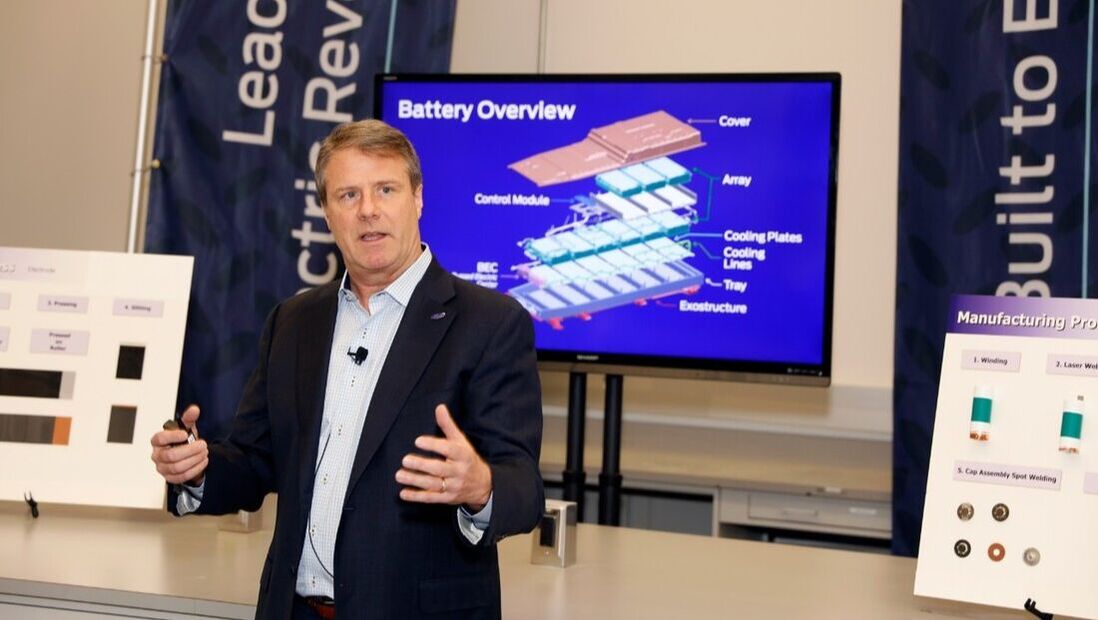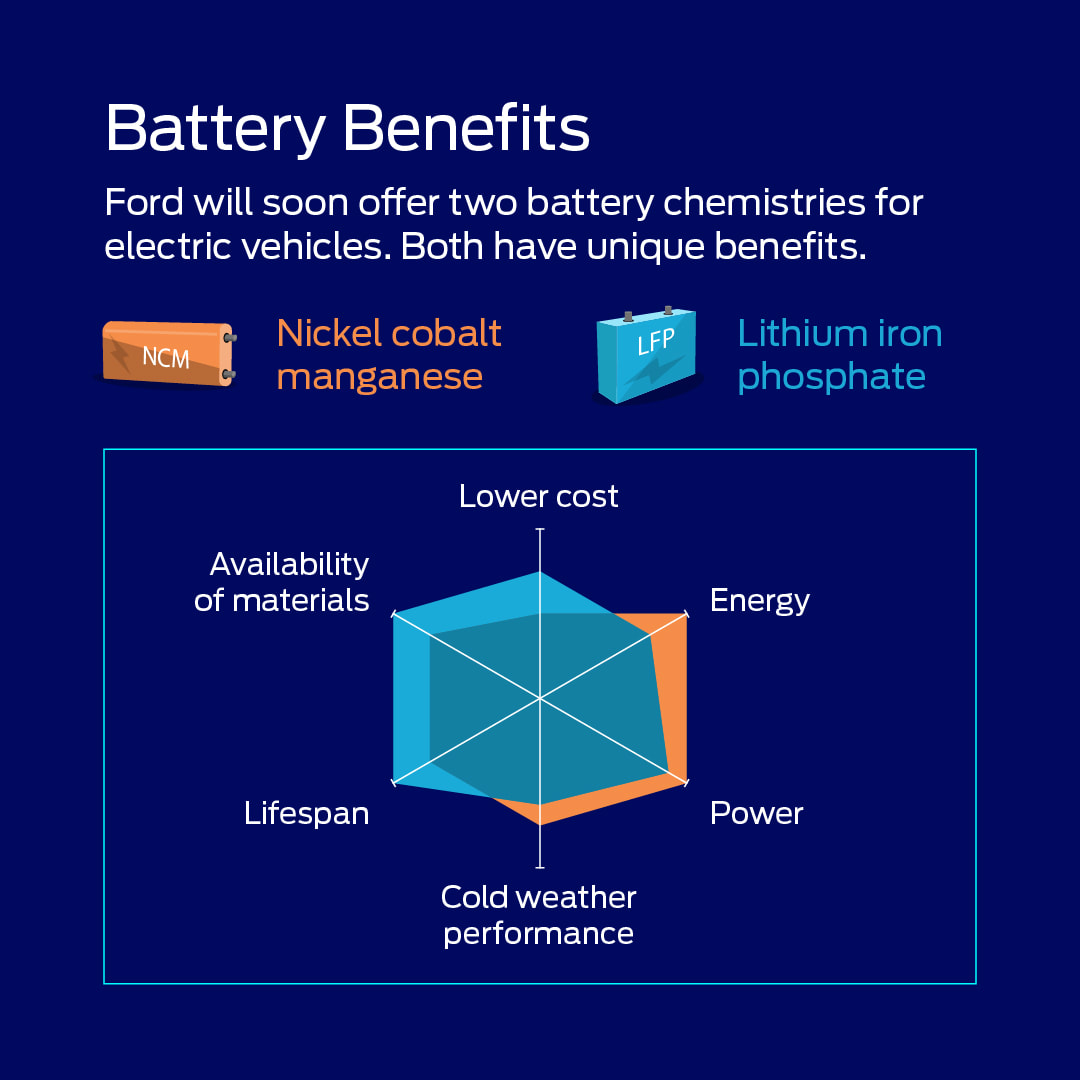Ford revealed its plans recently to invest $3.5 billion in constructing the first-ever automaker-supported lithium iron phosphate (LFP) battery factory in the country. This move will give customers access to a new battery chemistry option for Ford's EV lineup, adding to the current lithium-ion battery technology.
They're calling it BlueOval Battery Park Michigan - that's where 2,500 people will get to work in 2026 producing LFP batteries for Ford's electric vehicles - and it is the first of it's kind here in the US. While other automakers use the LFP battery chemistry in their electric vehicles, Ford will be the first to own it's own LFP factory here in the country and it's only a small part of the commitment the company is making to the electric revolution. Ford and its battery tech partners have committed to investing in electric vehicle and battery production in the US. And since 2019 - with this latest $3.5 billion investment included - the total commitment comes to $17.6 billion. This investment is part of Ford's larger plan to invest over $50 billion in electric vehicles globally by 2026. The investments made in the next three years will create over 18,000 direct jobs in Michigan, Kentucky, Tennessee, Ohio, and Missouri, and over 100,000 indirect jobs, according to an independent study conducted in 2020. These investments mark a significant step towards creating a more sustainable future and increasing job opportunities here in the US. “We are committed to leading the electric vehicle revolution in America, and that means investing in the technology and jobs that will keep us on the cutting edge of this global transformation in our industry,” said Bill Ford, Ford executive chair. “I am also proud that we chose our home state of Michigan for this critical battery production hub.” By diversifying and localizing its battery supply chain in the countries where it produces EVs, Ford aims to make its vehicles more accessible and affordable for customers, while also strengthening consumer demand. As part of its Ford+ plan, the company is striving to achieve an annual production rate of 600,000 electric vehicles worldwide by the end of 2023 and 2 million globally by the end of 2026. As Ford ramps up its electric vehicle production, the introduction of LFP batteries will enable the company to produce a higher number of electric vehicles and provide a wider range of options to new EV customers.
By offering LFP batteries as an alternative to nickel cobalt manganese (NCM) batteries, Ford is providing its customers with the flexibility to choose the battery chemistry that best fits their specific needs. LFP batteries are known for their durability and ability to handle frequent and fast charging, all while utilizing fewer high-demand, high-cost materials.
This cost-effective battery, produced at scale, will assist Ford in maintaining or even lowering the prices of its electric vehicles, making them more affordable for customers. Ford plans to use these LFP batteries to power a range of next-generation EV passenger vehicles and trucks currently in development, with most being produced in the US. “Ford’s electric vehicle lineup has generated huge demand. To get as many Ford EVs to customers as possible, we’re the first automaker to commit to build both NCM and LFP batteries in the United States,” said Jim Farley, Ford president and CEO. “We’re delivering on our commitments as we scale LFP and NCM batteries and thousands, and soon millions, of customers will begin to reap the benefits of Ford EVs with cutting-edge, durable battery technologies that are growing more affordable over time.”
As a means to increase production capacity and reduce wait times for customers, Ford plans to introduce LFP batteries on the Mustang Mach-E this year and on the F-150 Lightning in 2024, even before the new battery plant becomes operational.
As a part of its strategy, Ford has forged a new agreement with Contemporary Amperex Technology Co., Limited (CATL) – the world's leading battery manufacturer. The agreement will allow Ford's wholly owned subsidiary to manufacture battery cells using LFP battery cell expertise and services provided by CATL. These LFP battery cells will be integrated by Ford engineers into its electric vehicles, as the company looks to expand its battery capacity and technology through various key collaborations. This agreement with CATL adds to Ford's existing battery capacity and technology, which has been made possible through collaborations with LG Energy Solution (LGES) and SK On. Through these partnerships, Ford is well-positioned to enhance its electric vehicle offerings and establish itself as a significant player in the expanding electric vehicle market.
Did you enjoy this article? Subscribe to the EV Resource Weekly newsletter and have news delivered directly to your email inbox weekly!
|
Details
Categories
All
Archives
June 2024
|
- Home
-
Learn.
-
EV 101
>
- EV Terminology
- What is an EV?
- Pros and Cons
- EV Types
- Are used EVs a good option?
- How much range do you really need?
- Real world range
- Types of charging and charging stations
- How Long Does It Take To Charge
- EV Charging Apps
- All about EV Batteries
- Regenerative Braking
- BEV System Components
- EV Maintenance
- EV Mythbusting >
- Podcast
- Newsletter
- Magazine
- Articles >
- Vehicle Reviews
- Alternative Fueling Station Locator
-
EV 101
>
- Connect.
- Experience.
- Deals
- Shop
- About Us




